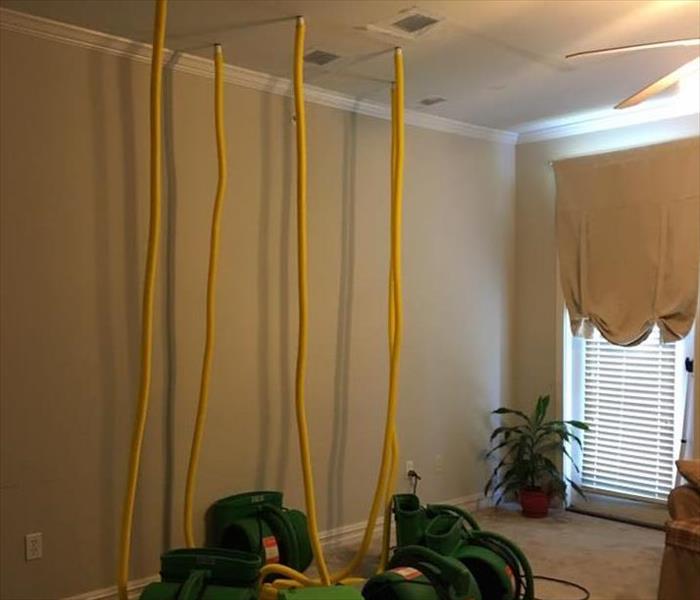6 Tips for Preventing Water Damages in Apartment Complexes and Multi-family Residential Properties
3/19/2020 (Permalink)
 SERVPRO of Greater Covington and Mandeville utilizes commercial drying equipment to properly dry apartment ceiling affected by water damage.
SERVPRO of Greater Covington and Mandeville utilizes commercial drying equipment to properly dry apartment ceiling affected by water damage.
Throughout the past couple of decades, many Greater New Orleans region natives, including both East Bank and West Bank locals, decided to move to the Northshore. A large wave of families moved after Hurricane Katrina either damaged or destroyed their homes and businesses. Many other families have slowly found their way to the north side of Lake Pontchartrain for a variety of other reasons, including the award-winning St. Tammany Parish school system, ample outdoor recreational activities, and the benefits of living in smaller, less crowded cities. And now that St. Tammany Parish industry is thriving, our population is growing exponentially.
In Covington, several apartment complexes have been built to accommodate the growing residential demand. Multifamily unit properties can present a higher risk for catastrophic damages, be that fire, water or mold damages. Water damages like those caused by broken pipes under kitchen sinks and overflowing toilets seem to be the most common. Apartment complex and multi-family residential property owners and property managers should take additional measures to help protect their property and save money in restoration costs.
Tips for Preventing Water Damages at Apartment Complexes and Multi-family Residental Properties
- Inspect buildings regularly and address any needed repairs immediately. Roof damages and faulty window sealings are common causes for slow water and moisture intrusions. Have a maintenance manager or hired professional inspect around the buildings a few times a year. Before and after hurricane season are two important times to do this to minimize storm damages.
- Check on vacant units once a week to detect any issues early on. Both time and money can be saved by quickly discovering accidents like a broken pipe leaking water or a water heater that has exploded. Open cabinets under sinks and inspect areas around water sources to uncover any slow water leaks. If a problem is found, then stop the water source immediately.
- Clearly mark all water supply and fire suppression system shut off valves. Make sure tenants are aware of their locations and how to properly turn them off in the event of a water leak or system ignition.
- Notify tenants of any potential issues, like a sensitive sewer system or hidden water supply lines. Our team once received a call for help because an apartment resident had accidentally nailed into a fire suppression line while trying to hang a photo on the living room wall. The tenant assumed the fire suppression line ran horizontally and not directly down the center back living room wall. Thankfully, our team was able to able to respond quickly, drying the affected materials within a few days.
- Remind tenants not to flush anything other than toilet paper down the toilets. This is a common cause of sewage backups resulting in overflowing toilets.
- Have a clear emergency response plan and communicate this with your tenants. Revise the plan as needed and update tenants once a year. Tenants should know how to respond quickly and efficiently in an emergency.
Please send an email to kayla@SERVPROofcovington.com for assistance with creating an emergency plan for your property or for water damage restoration help.






 24/7 Emergency Service
24/7 Emergency Service